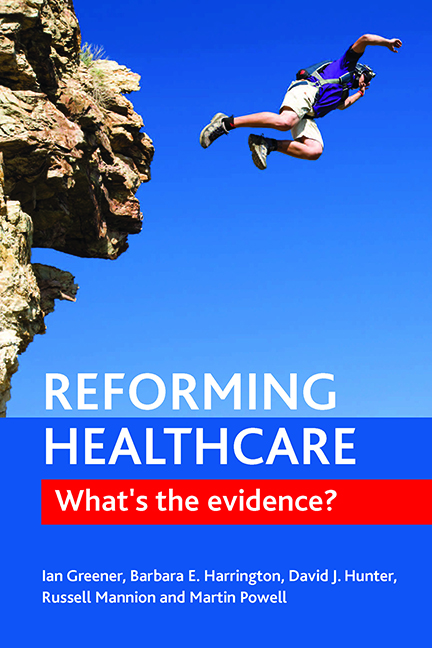Book contents
- Frontmatter
- Contents
- List of tables
- Acknowledgements
- one Introduction
- two The NHS in 1990
- three Reorganising the NHS, 1990–2010
- four ‘Central control’ reorganisation in the NHS in the 2000s
- five Local dynamic reform in the NHS since 2000
- six The prospects for NHS reorganisation post-2010
- seven Conclusion
- References
- Index
one - Introduction
Published online by Cambridge University Press: 25 February 2022
- Frontmatter
- Contents
- List of tables
- Acknowledgements
- one Introduction
- two The NHS in 1990
- three Reorganising the NHS, 1990–2010
- four ‘Central control’ reorganisation in the NHS in the 2000s
- five Local dynamic reform in the NHS since 2000
- six The prospects for NHS reorganisation post-2010
- seven Conclusion
- References
- Index
Summary
I used to pore over the latest offerings from various highly reputable academic or scholarly quarters, and find nothing of any real practical help. (Tony Blair, cited in Powell, 2011)
During the 2000s there was a great deal of rhetoric about evidencebased policy and evidence-based policy-making (Davies et al, 2000; Perkins et al, 2010). However, policy and policy-making often appear to be rather more based on the existing ideas (or even prejudices or ideologies) of those in positions of power rather than on research evidence. And there are several reasons for this.
Policy-makers may believe they already know what needs to be done, and so do not need to examine what research says. Equally, those in positions of power may find research inaccessible in terms of its place of publication, or that it is written in dense, academic language they find difficult to understand. They may also find research to be too equivocal, too concerned with trying to consider both sides of a problem than coming to a conclusion or solution that they can get on with turning into a workable policy. Policy-makers may also have strong views about what needs to be done by government, regardless of what researchers are telling them, often seeming to put their own political goals ahead of research, and their ideology ahead of evidence.
When looking back at NHS reorganisations, it does seems to be the case that since the 1980s policy-makers have been unable to resist changing organisational structures, not even waiting to see if the last changes they attempted to put into place had worked or hadn’t. Secretaries of State for Health have sometimes seemed as if they are intent on leaving their own impression on the NHS organisation without considering whether what they are planning to change has any real chance of working.
From the perspective of academics and researchers, on the other hand, policy-makers and politicians often appear to have short attention spans and do not want to engage with the complexities of the area they are trying to change. Politicians can sometimes look as if they have decided what needs to be done without looking at lessons from the past or from other countries.
- Type
- Chapter
- Information
- Reforming HealthcareWhat's the Evidence?, pp. 1 - 10Publisher: Bristol University PressPrint publication year: 2014



